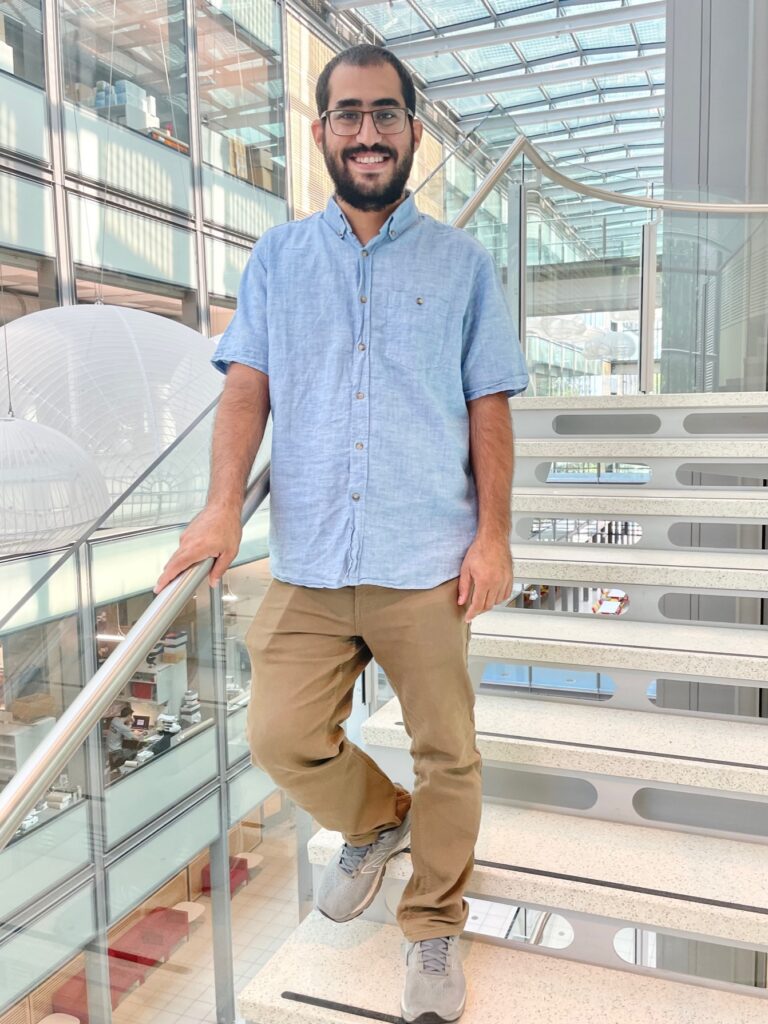Postdoc Q&A: A Conversation with Qais Jaber
Under the Fulbright Visiting Scholar Program, Postdoc Qais Jaber arrived at Princeton Chemistry this summer from his home in Israel to study RNA chemistry and biology in the Kleiner Lab. Jaber received his undergraduate, master’s, and doctoral degrees from Tel Aviv University, successfully defending his doctorate in December of 2022. His work at the interface of organic chemistry and antibacterial/antifungal agents drove an interest in RNA research in the United States.
In honor of Postdoc Appreciation Week, celebrated this year from Sept. 18 to Sept. 22, we publish this Q&A with one of the Frick community’s newest postdocs.
Can you tell us a little bit about growing up in Israel?
I was born in Tayibe, Israel. It’s a small town about an hour from Tel Aviv. I have three siblings. It was a normal life, a happy life. My parents always wanted me to have a degree. I’m not the first to go to university in my family, but I’m one of the few. But I am the first one to have a Ph.D., so my family is very proud. And when I say family, I mean 150 people. I have 20 uncles, I think, from both sides, and lots of cousins.
It was difficult to leave home when you have all of your family in the same place. My house was here, my parents’ house was right near it, and my wife’s parents house was here, two minutes from us. It was very tough.

Postdoctoral Fellow and Fulbright Visiting Scholar in the Kleiner Lab, Qais Jaber.
Why RNA research?
My Ph.D. is in organic chemistry answering fundamental questions related to anti-fungals, anti-bacterials, and other biological properties. The fact that RNA modifications have an essential and emerging role in biology and also human diseases like cancer and genetic diseases makes me want to dive into the RNA world to try to answer its fundamental questions. There’s a new field called epitranscriptomics where it starts to make more sense why people are so different from each other, why every cell is different from other cells in the body, how different things manifest in one person and not another. This is very interesting to me.
In my home country, there are not a lot of experts dealing with RNA biology and chemistry together. So I think it is a wonderful opportunity to learn the biological area of RNA here in the Kleiner Lab. Then, in the future, I can combine it with my current skills for establishing a new field that would interface with what we have there already in my home country.
So, you came here to study with the Kleiner Lab?
First, I came because Princeton University is known worldwide. Second, Ralph Kleiner is a very interesting person. Very young, very accomplished. I started reading some papers from Ralph’s lab and saw that he’s using a new approach for studying chemistry and biology and RNA and chemical modifications. So I emailed him and we chatted, and that’s where it all started. Since then, I have found that Ralph is a very supportive professor. He not only comes up with new ideas, but he is open to new ideas. It was very important for me that I am in a group with a young P.I.
Can you describe your research?
RNA displays the most notable diversity in modification chemistry among biological macro-molecules, but we lack an understanding of RNA modifications and RNA modifying enzymes in many species, including bacteria. Therefore, my research goal is to characterize the RNA chemical modifications and RNA-modifying enzymes in pathogenic bacteria and identify the role of these enzymes in the bacterial physiology, morphology, and virulence. This project will provide the first unbiased screen of RNA-modifying enzymes in pathogenic bacteria and will reveal fundamental insights into their biology, and provide opportunities for the development of the next generation of antibiotics.
How are you enjoying life in the U.S.?
My wife and I are enjoying being here, but there are a lot of things I didn’t imagine. It’s our first time in the U.S. so we have some culture shock. For example, they told me all the time that it would be expensive to live here, but actually it’s much more expensive than I imagined it would be. It’s quite different. But it’s also very peaceful, very quiet. We currently live in Princeton, and everyone is so nice. You go down the street and people say hello to you. It’s very nice.
What do you hope to accomplish while you’re here?
My ultimate goal is to raise my children peacefully and to teach them in a good environment and give them the necessary skills for the future.
My professional goal is to keep learning and becoming a better version of myself every day. In this journey I hope to answer fundamental biological questions related to RNA and to help the Kleiner Lab provide new insights for the RNA chemical modification, and hopefully write for a high-impact publication.
